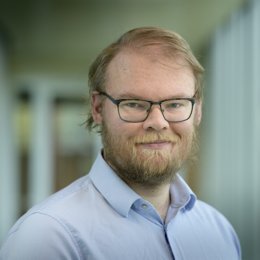The Dutch Research Council for Scientific Research (NWO), has awarded Vidi funding to four UT research projects. These are studies led by Arnd Hartmanns, Linn Leppert, Jelmer Renema and Roland van Rijswijk-Deij. With this contribution of 800,000 euros, they can develop an innovative line of research and set up a research group in the coming five years.
TRUSTWORTHY ANALYSIS OF STOCHASTIC TIMED SYSTEMS
Formal methods and tools group (FMT; Faculty of EEMCS) - dr. ing. A. Hartmanns
We rely on storm surge barriers, nuclear power plants, and other critical systems to work safely even when operators make errors or equipment fails at inconvenient random moments. Experts use special software to design these systems and ensure they are reliable. But how to ensure this software is correct? This research combines mathematics and computer science to develop software for the experts that cannot be wrong: Its algorithms come with mathematical proofs of correctness that have been checked by a computer using a so-called theorem prover; and the theorem prover equally shows that the software itself implements these algorithms correctly.
“CATCH A WAVE” – DIRECTING ENERGY- AND CHARGE-TRANSFER IN SOFT MATERIALS
Computational Chemical Physics group (CCP; Faculty of S&T) - dr. L. Leppert
Shining light on a material can lead to transport of energy and charges. Nature exploits these processes to efficiently convert the energy of sunlight into chemical energy in photosynthesis. In technological applications, however, the flow of energy and charges is often inefficient, slow, and random. This project’s goal is to understand how to direct energy- and charge transfer through the wave-like motion of atoms in soft materials. For that purpose, the researchers will develop methods for large-scale computer simulations of the quantum-mechanical processes underpinning energy- and charge-transfer in light-converting materials.
AT THE QUANTUM EDGE
Adaptive Quantum Optics group (AQO; Faculty of S&T) - dr. J.J. Renema Universiteit Twente
What applications can we find for near-term quantum computers? A clear answer to this question is blocked by our poor understanding of the interplay between noise and programming in quantum systems which are large enough to show complex behaviour but too small to deploy error correction (NISQ regime). In this project, a team of physicists will solve this question, focusing on photonic quantum systems specifically.
SHARQS: TOWARDS A SYSTEMATIC HOLISTIC APPROACH FOR RE-ENGINEERING A QUANTUM-SAFE INTERNET
Design and Analysis of Communication Systems group (DACS; Faculty of EEMCS) - prof. dr. ir. R.M. van Rijswijk-Deij
Cryptography is a cornerstone of the modern Internet. Unfortunately, the cryptographic algorithms that we use today can be trivially broken using a quantum computer. This would spell the end of confidentiality and privacy on the Internet. It is therefore essential that we transition to quantum‐safe cryptography. Yet how do we do this at Internet scale? The SHARQS project addresses this challenge by proposing a systematic approach for transitioning to a quantum‐safe Internet.








